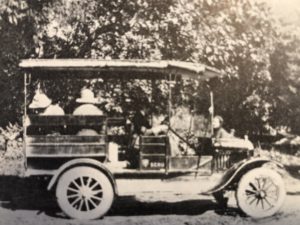“Take the blessés to the camion”: a Smithie Lexicon
The women of the Smith College Relief Unit were all changed by their experience in France– and so was their prose.
Reading the letters of the Smithies in France and their compatriots, the American ambulancemen and aviators, one of the things that jumps out is the zippy new dialect they all adopt, an enthusiastic mix of Franglais (anglicized French) and war slang.

Here, for your amusement, are some of the more widely used terms:
— Camions: trucks. The drive at Grecourt was constantly being blocked by Red Cross camions, because Dave, the Red Cross Driver, had an unerring ability to land himself in the ditch by the gate (by accident or design, they weren’t quite sure). Other camions in the Smithies’ lives included army camions, of which there were many rumbling down the roads. Their own vehicles, however, they referred to as “the machines”, or, more specifically, “the White”, “the jitney”, and “the Ford truck”.
— Essence: gasoline. There’s never enough essence to keep the camions running properly, and don’t even get the Assistant Director of the Unit started on the price of essence. A dollar the gallon! Outrageous!
— Blessés: the wounded. Later, the Smithies make the distinction between petits blessés and grands blessés (the walking wounded and the gravely wounded), but the general shorthand for the wounded is simply blessés, as in “I’m taking chocolates and newspapers to my blessés today– they do so love the English papers.”
— Poilus: the rank and file of the French army, very useful for things like hanging oiled paper over the empty windows of the Orangerie.
— Tommies: the rank and file of the British army, very useful for things like laying “duckwalk”, a contraption of wood and wire designed to stop you from sinking knee deep in the mud. Will work for tea.
— Sammies, alternatively known as “our boys”. American soldiers were Sammies for Uncle Sam, as in “we saw a group of Sammies at Saint-Nazaire.”
— Amis: Quakers. Literally, “friends” in French. There were a group of American Quakers based at Ham who helped the Smithies with their building projects. Some of the group thought the Quakers ought to be shunned for their pacifism, but, on the whole, the Amis were regarded as great friends of the Unit. Used as in “we had a group of Amis to tea today.”
— Boche: Germans. When one thinks of World War I slang for Germans, “the Hun” is usually what comes to mind, but the Smith Unit were all about the Boche. Also used as in….
— Boche baby: a baby with a French mother and German father. The Germans had occupied the area for nearly three years before retreating in March of 1917. They were not always respectful of the female population. Some of the liaisons were consensual. Many were not. The Unit delivered and cared for several Boche babies, adamant that whatever their fathers might have been, the children would be raised to be well-loved children of France.
— Avec les Boches: with the Germans. In the villages the Smithies came to serve, the Germans had rounded up most of the able-bodied men and women and sent them to work camps in Germany. Every family the Smith women worked with had at least one, and sometimes several, family members away “avec les Boches“, their fate unknown. Not long before the German retreat, the Germans had rounded up the teenage girls to be sent away, and the stories the Smithies heard of daughters and sisters avec les boches were truly heartbreaking.
— Boche button: some sort of soil-based infection. Cuts, even very minor ones, tended to fester, due to something in the soil. Many of the Unit wound up with cuts that just wouldn’t heal. In their letters, some of the Unit referred to this as “Boche button”. I’m not entirely sure why French soil was the fault of the Boche, but there you go. I’m also convinced the Smith Unit invented this one purely to drive future researchers mad; I haven’t been able to find it anywhere other than their letters.
— War bread: the food everyone loved to hate. (More on this in a later post.) Due to the requisitioning of flour to make bread for the army, bread for civilians got… grainy. Now, we’d probably call it artisanal and charge more for it, but at the time it was simply war bread and deeply despised by locals and Smithies alike.
—Les Collégiennes Américaines: the Smith Unit. This gets extra points for being peak Franglais– something that sounds like it ought to translate properly, but doesn’t. When the Smith Unit arrived in France, their founder decided they needed a snappy nom du guerre, a French handle by which the French press could refer to them without stumbling over the syllables of “Smith College Relief Unit”. The only thing is that in France, “collégiennes”, as in the UK and everywhere but the US, tend not to be university students, but Middle Schoolers. The Smith Unit were many things, but they were not twelve. Over their time in France, the Smith Unit dropped the “Collégiennes” and became known as Les Dames Américaines instead.
Les Dames Américaines and their camions will be coming your way on March 2, 2021. You can learn more here.

Very interesting. Future readers will want to know these. I wondered how things turned out for the
Boche babies, and also the people taken by the Germans.
Can’t wait to read it! This was a super interesting post!